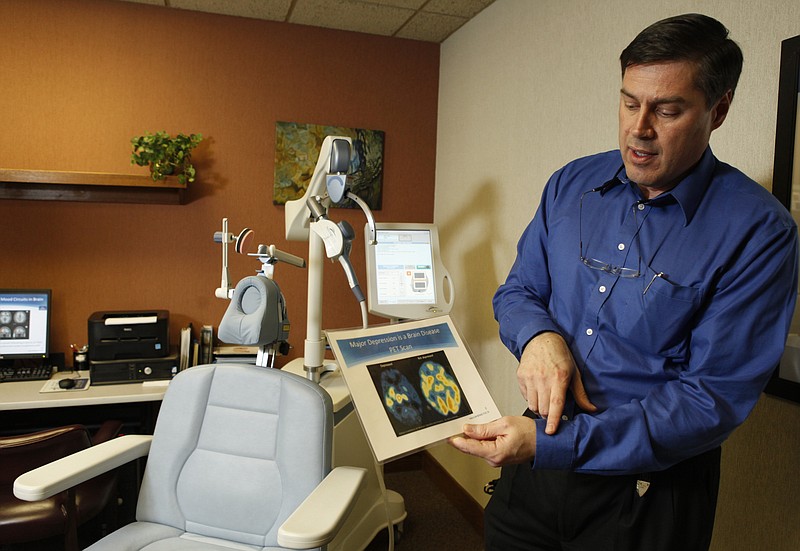For 19 years of her life, Amy Lutz didn't laugh. Diagnosed with depression at 19, the now 38-year-old went through medication after medication.
"I had all the trappings of a good life -- a stable job, a family, a boyfriend -- but when you are depressed you don't realize that emotionally," Lutz said.
Then in September, Lutz began a relatively new drug-free treatment for depression, FDA-approved for patients who do not respond to anti-depressants. Transcranial magnetic stimulation therapy is a noninvasive brain treatment that activates nerve cells involved in mood control and depression.
"It was totally life- transforming," Lutz said. "I would definitely recommend it to anyone who hasn't been able to get help from anti-depressants, who thought what they are feeling is as good as it gets."
Dr. Tim Jennings, a Chattanooga psychiatrist, has provided the treatment since May 2011.
"We've seen lives change with this," Jennings said. "Many people with depression begin to lose hope. They should know there is another treatment available."
During the treatment, the patient is seated in a chair with a headrest. A measuring tool is used to determine exactly where the electromagnetic device should be placed on the patient's head.
In a typical 37-minute treatment, the magnetic device delivers a pulse for four seconds, stops for 26 seconds and then delivers a pulse for four seconds. The patient feels only a slight vibration, Jennings said. Some patients may have a tender spot on the scalp for the first few treatments, he said, but that usually goes away.
"I had a patient snoring while getting the treatment," Jennings said.
Patients are treated five times a week for six weeks. The treatment is then gradually decreased until they are getting only one treatment once a month.
Jennings said the treatment appears to be more effective than traditional drugs. In the FDA studies, the patients used in the trials had already failed to respond to one regimen of drug treatments for depression. They were then taken off their drugs for two weeks before beginning treatment, Jennings said.
Under those conditions, 35 percent of the patients reported a 100 percent improvement, while 53 percent reported a 50 percent improvement.
More recent studies, in which patients are gradually taken off drugs while undergoing the treatments, show as many as 70 percent of the patients recovering, Jennings said.
By comparison, only 26 percent of patients recover during initial drug treatments for depression, and those numbers decrease in each additional treatment, Jennings said. Unlike anti-depressant pills, the brain-stimulation treatment has no known long-term side affects, he said.
So far, most insurance companies in Tennessee do not cover the treatment -- an issue that Jennings hopes will soon change since it has been FDA approved and is becoming more common. In some other states, insurance companies do cover it.
A six-week treatment regimen costs $12,000 to $16,000.
That is still less costly than long-term drug costs for treating severe depression, Jennings said.
For Lutz, the treatment has been worth every penny.
"I found it nearly impossible to believe pointing a magnet at my head was going to make me feel better; it really sounds too good to be true, but its not," she said.
